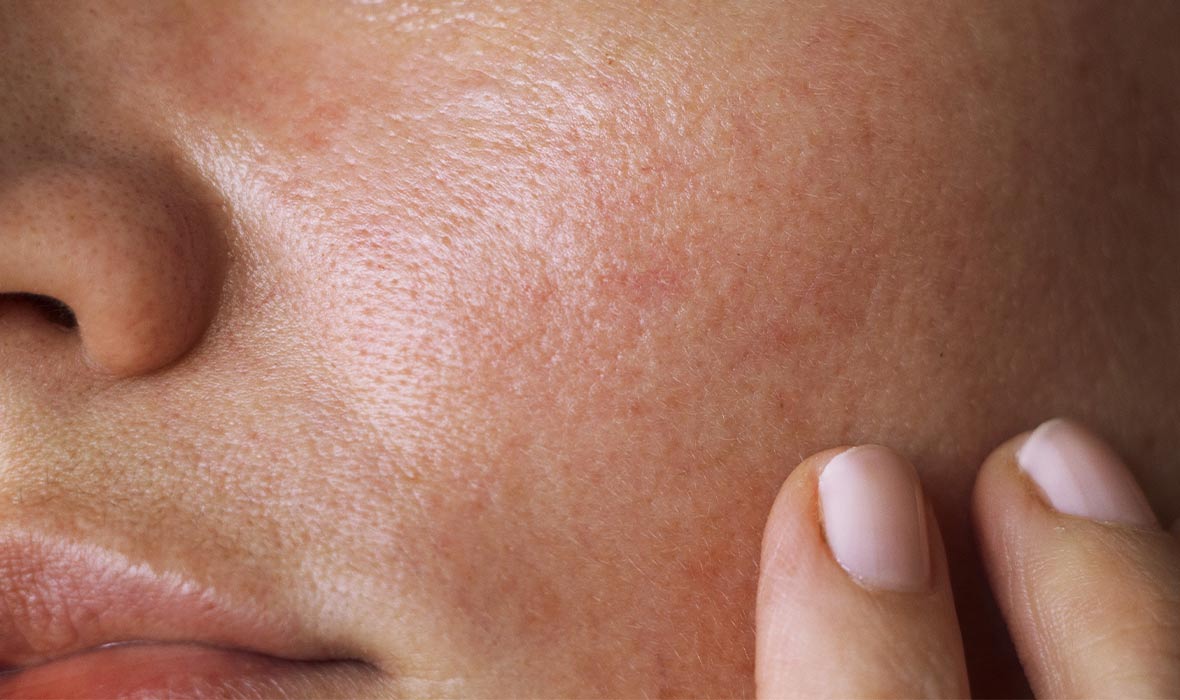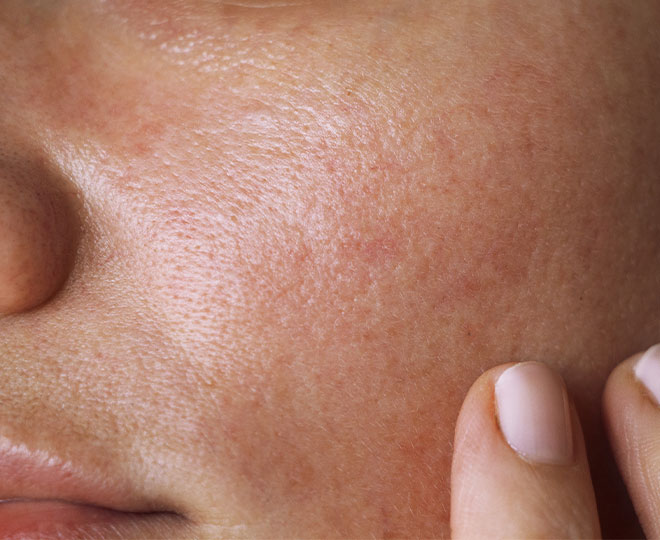Wondering why your complexion is shiny, no matter how often you cleanse or powder your face? If you’re questioning, "Why is my face so oily?", you’ve come to the right place. You’re about to learn the telltale signs of oily skin, what causes oily skin, what you might be doing that’s making your skin extra oily and how to make your skin less oily. Plus, you’ll even learn the very desirable benefits to having oily skin!
Signs of oily skin
First, you should know that you’re not alone. In fact, everyone needs some oil in their skin. And oil isn’t necessarily a bad thing — unless you have too much of it.
You see, each of your pores has a sebaceous gland that produces sebum, which is the natural oil that keeps your skin healthy and hydrated. And yes, some people produce more sebum than is needed which can lead to a greasy complexion and breakouts. That’s because this sebum can mix with the dead skin cells and build up in your pores.
So how do you truly know if you technically have oily skin? Here are signs to look out for to know if your sebaceous glands are overproducing oil:
- Your skin may feel greasy, even after you just cleansed an hour or two ago.
- Your skin always seems to have an extra shine to it.
- You have constant breakouts and the pores on your forehead, nose, and chin (the T-zone) appear large.
- Makeup setting, mattifying powders, and/or blotting sheets don’t keep your skin from looking greasy by the end of the day.
- Your foundation doesn’t seem to stay on your skin.
- Your skin may appear rough or thick.
- You notice clogged pores and blackheads.
Your T-zone often produces more oil than the rest of your face. If your skin is too oily, you’ll notice your whole face is oily. However, if your T-zone is oily but your cheeks are dry or normal, you’re more likely to have combination skin. Even dry skin can have too much oil, causing what’s known as a combination of oily and dry skin type.
But don’t fret yet about having oily skin — there are definitely perks to having all that sebum…
Benefits of oily skin
If you have oily skin, consider yourself lucky — you may not show signs of aging as quick as those with dry or combination skin. Bonus, right!?
Sebum does not have to be a bummer. In fact, it lubricates your skin, can help regulate inflammation, and even has antibacterial properties. Oil can actually help preserve your skin, thicken your skin, and slow the appearance of wrinkles.
But staying shiny isn’t your skin’s best bet — too much sebum can lead to breakouts. It’s best to help your skin find balance between its natural moisture and excess oil.
Before you learn how to reduce the excess oil in your skin, it’s important to know what actually causes it.
What causes oily skin?
As you read above, your sebaceous glands could be making too much sebum, that oily, waxy stuff that hydrates and protect your skin. But what sends your sebaceous glands into high gear? It can be due to anything from genetics to hormones to stress—even the weather effects our sebaceous glands.
Genetics:
Do your ‘rents have oily skin? That may well be a reason you do, too. That’s because overactive sebaceous glands can run in families. Typically, the larger your pores, the more oil your skin will produce. Pore size can even vary by ethnicity.
But before you go blaming your parents, though, you should know that androgens play a role as well. Testosterone is an androgen present in females and males produced in the sebaceous glands. Studies have linked higher levels of it to increased oil production, which explains why those going through puberty have acne since testosterone levels are especially high during that time in a person’s life.
Humid climates:
The time of year and where you live can affect your oil levels, as humidity and heat often lead to more oil production and sweating.
Washing your face too often:
Yes, you read that right. Washing your face regularly twice a day can help reduce excess oil. But cleansing or exfoliating too often can ramp up that oil production because it strips too much oil from the skin. Then your skin goes into panic mode, overproducing oil to make up for the loss.
Certain medications:
Some medications (like birth control, steroids, and growth hormones) are linked to excess sebum production. Before making any decisions about what meds to stay on, check with your doctor to see if the prescriptions you take may be contributing to your oily skin.
Pore-clogging cosmetics:
Yes, the makeup you’re putting on your face to cover acne can actually be perpetuating it. But it doesn’t have to. Looks for oil-free, noncomedogenic products. There are also foundations with acne-fighting ingredients like salicylic acid, so you may want to seek those out instead. And, no matter what makeup you’re wearing, make sure to remove it thoroughly each night.Stress:
Don’t stress over your acne because that can actually make it worse! It turns out that the corticotropin-releasing hormone can bind to your sebaceous glands. And that increases their oil production. Try incorporating de-stressing activities (like taking a walk, relaxing, doing yoga, or meditating) into your routine to help balance your stress levels.
How to reduce oily skin
Have no fear, you can reduce the amount of oil your sebaceous glands produce without over-stripping skin. A water-based, lightweight moisturizer (like the Proactiv Green Tea Moisturizer) can do wonders for oily skin, especially skin that’s been treated with benzoyl peroxide or salicylic acid.
Make sure not to wash your face more than twice per day unless you’re in hot weather or sweat from a workout and need an extra wash from time to time. You can also pat your face dry when you’re sweating with a clean cloth or blotting tissue.
But how do you prevent skin from getting oily in the first place? Find out now!
How to prevent oily skin
A consistent skincare routine is the best place to start. Here are some things you can do to take control of the oil:
Wash your face with the right cleanser:
The Proactiv Renewing Cleanser effectively washes away dirt, oil, impurities, and pore-clogging dead skin cells — without stripping skin.Moisturize:
Lightweight moisturizers should not make your skin greasier. In fact, the extra moisture can keep the skin protected and hydrated so it doesn’t have to overproduce oil to overcompensate.Choose non-comedogenic makeup and sunscreen:
Choose water-based products over oil-based as they’re less likely to clog pores. Your skin can dry out too much when you don’t wear sunscreen, leading to more oil production, so make sure to wear sunscreen every day, even if you’re only getting limited sun exposure.Avoid touching your face:
Not touching your face can be a tricky one, especially because we often do it without realizing it! But your hands transfer oil, bacteria, and dirt to your face which leads to a buildup of oil. So if you catch yourself touching your face, stop! Also try not to pick your acne as that not only aggravates your skin, it can also increase oil production.
Must-have products for oily skin
Want to make removing excess oil and treating your acne super simple and easy? Thanks to benzoyl peroxide, the Proactiv Solution system targets the root cause of acne – bacteria. Plus, it removes excess oil and dead skin cell buildup to treat acne-prone skin. Benzoyl peroxide works to treat and prevent acne by killing bacteria in your pores, as well as helping the pores shed dead skin cells and excess oil.
Proactiv Solution is just 3 simple steps to less oily skin!
The bottom line
Oily skin can have many complex causes. But when you’re empowered with information, effective products, and the will to stick to a healthy skin care routine, you’re on your way to clearer, more balanced skin.






